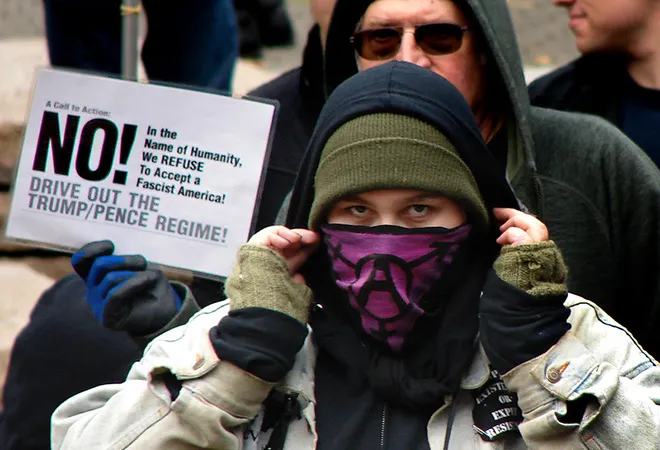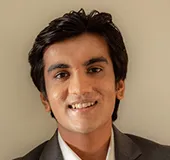
George Floyd’s killing by police officers in Minnesota sparked global outrage against police brutality and systemic racism faced by the African-American community in the United States. Amidst this outrage that sought accountability from lawmakers regarding their ambivalence towards racism, US President Donald Trump attributed the violence caused by protests to the Antifa, a decentralised and leaderless anti-fascist movement aimed at combating white supremacy. While no evidence exists supporting the claim that the Antifa had caused the protests with some reports even claiming white supremacist groups to be responsible, Trump’s assertion that all the misdemeanours observed in Minnesota can be attributed to one such far left movement is troublesome.
Irrespective of the truth to Trump’s claim about Antifa’s alleged involvement in the violence, his desire to label them as a terrorist organisation reflects a case wherein self-interest shapes the notion of the adversary.
“We could find no evidence that anybody who claimed association with Antifa went there to plant a bomb or kill someone,” noted Gary Lafee, a terrorism expert from the University of Maryland. Moreover, the Antifa movement has no organisational structure or clear chain of command that may enable them to be wholly responsible for the widespread destruction observed in Minnesota. Irrespective of the truth to Trump’s claim about Antifa’s alleged involvement in the violence, his desire to label them as a terrorist organisation reflects a case wherein self-interest shapes the notion of the adversary.
Self-interest informing America’s notion of the adversary
Trump’s desire to deem the Antifa to be a terrorist organisation may be dangerous and misguided, but it does seem to reflect a pattern in US counter-terrorism that is not novel. America’s sense of “exceptionalism” and its perceived hegemon status has sought a fluid and utilitarian notion of the adversary that is shaped by self-interest. American exceptionalism has underscored perceptions of the US being the “chosen nation” and this heightened self-image has greatly contributed to the construction of American foreign policy and its counter-terrorism posture. History is abounded with examples wherein America’s notion of the adversary has shifted according to differing utilitarian interests — most prominently witnessed in the relegation of the Mujahedeen from crucial operational ally during the Soviet War to abettors of the Al-Qaeda post 9/11.
American exceptionalism has underscored perceptions of the US being the “chosen nation” and this heightened self-image has greatly contributed to the construction of American foreign policy and its counter-terrorism posture.
More recently, the Trump administration’s abandoning of the Kurds — a group crucial in America’s efforts to defeat the Islamic State (ISIS) also showcased a utilitarian notion of adversary. Trump’s decision to withdraw troops from Northeast Syria citing an effort at showing military restraint saw bipartisan criticism with many claiming the decision would help resuscitate ISIS presence in the Middle East. Some even explained this decision as a ploy to strengthen the US relationship with Turkey, a NATO ally. Whatever the rationale may be for Trump abandoning a crucial ally in the Kurds, the willingness to do so based on utilitarian interests reiterates America’s emphasis on self-interest informing the notion of the adversary. This in turn gives the US some leeway in fulfilling tactical objectives that may shift in accordance to evolving socio-political contexts.
Similarly, Trump’s decision to deem Antifa as a terrorist group can also be viewed through the prism of self-interest governing America's notion of the adversary. At a time when protestors are seeking accountability from US law enforcement regarding their ambivalence towards bigotry, a decision to demonise the Antifa without any evidence linking them to the violence raises doubts about the dispensation’s agenda. It is worth noting that historical precedent has primarily seen US terror threats as being foreign and Trump’s desire to label a domestic entity like Antifa as a terror group marks a major shift that seems to indicate changing utilitarian interests of the ruling dispensation.
Doubling down on far-left movements and attributing violence during a pandemic to the Antifa helps Trump mobilise his core conservative voter base that have previously shown great affinity to similar narratives that provide them with a victim status against anarchist elements in far-left groups.
The utilitarian interest in labeling Antifa as a terrorist organisation also reflects domestic political considerations. Doubling down on far-left movements and attributing violence during a pandemic to the Antifa helps Trump mobilise his core conservative voter base that have previously shown great affinity to similar narratives that provide them with a victim status against anarchist elements in far-left groups. Thus, multiple dimensions to the dispensation’s self-interest seem to be at play in determining Trump’s stance against the Antifa. As noted by Mark Bray, author of Antifa: The Antifascist Handbook, Trump’s hidden agenda seems to be in shifting focus from George Floyd’s death and its underlying causes to “how to stop the shadowy boogeyman.” The Antifa’s positioning as the “shadowy boogeyman” seems to embody a violent distillation of everything the conservatives fear and helps in providing a comforting explanation to the violence. Incidentally, this explanation also sits well with Trump’s most ardent supporters that have considered far-left movements as a threat to American society.
Why does Trump want to single out Antifa?
i. Need for a common enemy
In times of chaos, controlling the narrative becomes a policy imperative for ruling dispensations. The protests calling out systemic racism in the United States also raised questions about the complicity of the government in turning a blind eye to gross inequalities. Thus, a need for the government to take control of the narrative and absolve itself of responsibility for the situation can help explain Trump’s desire to attribute the violence to Antifa. The perception of a homogenous and well-defined common enemy has shown to fulfill important functions in human life with some research noting that such perceptions help forge unity and provide simplistic understandings of complex problems. Thus, by blaming the protests on Antifa, Trump has tried to delegitimise the protests and also attempted to avoid addressing the complex socio-cultural divides that are at the core of the protestor’s anger. Moreover, Trump’s readiness to deploy the US military on US soil to contain the protests reiterates the need for a common enemy to legitimise such strong retaliatory measures. These same measures may be tougher to explain if protests are understood as the consequences of organic rage against systemic oppression being normalised by the state.
By blaming the protests on Antifa, Trump has tried to delegitimise the protests and also attempted to avoid addressing the complex socio-cultural divides that are at the core of the protestor’s anger.
As iterated earlier, the Antifa movement does not have any documented history of murder or the human capital to cause the destruction Trump claims they have caused. Trump’s desire to make Antifa a scapegoat in this case may also reflect a need to provide citizens with an illusory sense of control. George Floyd’s death and the questions it raises about minority rights in the US do not have easy answers. In such cases, a common enemy can help simplify the situation for citizens by linking the violence to a clearly understandable and controllable cause.
ii. Need to downplay the rage of the protests
“It's the ANTIFA and the Radical Left. Don’t lay the blame on others” tweeted Trump — first indicating his desire to pin the violence on the Antifa. This in conjunction with Trump’s ambivalence towards the white supremacist attacks in Charlottesville in 2017 wherein he claimed, “there were fine people on both sides,” showcases a double standard and an agenda to selectively malign far-left movements.
Blaming Antifa also allows Trump to push a narrative that the violent protests are happening in a “top down” fashion rather than acknowledging the cascading effect of George Floyd’s murder.
Furthermore, blaming Antifa also allows Trump to push a narrative that the violent protests are happening in a “top down” fashion rather than acknowledging the cascading effect of George Floyd’s murder in causing a mass awakening to the injustices confronting minorities in the United States.
Conclusion
Trump’s tweets have revealed that “terrorism is an inherently political label, easily used and misused.” As illustrated in this article, American counter-terrorism has used this label to suit its self-interest and Trump’s accusation against Antifa is reflective of this pattern. However, the lack of consensus on what ‘terrorism’ constitutes and the leeway given to lawmakers to shape its meaning is dangerous. As noted by Hina Shamshi, Director of ASLU’s National Security project in relation to Trump’s tweet against Antifa, “There is no legal authority for designating a domestic group. Any such designation would raise significant due process and First Amendment concerns.”
Nonetheless, terrorism is a complex phenomenon that cannot remain static. It is bound to evolve along with changing geopolitical and domestic challenges and expecting a crystalised understanding of terrorism that has universal applicability may not be feasible. Still, as witnessed in the dangers of Trump’s accusation, it is imperative that the word “terrorist” is not used as a means of suppressing dissent of citizens, and deflecting attention from important issues that needs to be addressed.
The views expressed above belong to the author(s). ORF research and analyses now available on Telegram! Click here to access our curated content — blogs, longforms and interviews.




 PREV
PREV


